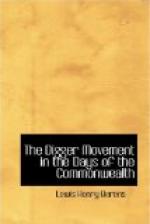That religious conformity was a necessary condition of national unity, aye, even of national existence, was, however, still accepted as an axiomatic truth by those whose mental visions were limited by inherited conceptions. To such as these the only question at issue seems to have been whether an Episcopalian or a Presbyterian system of Church government should prevail. Of the claims of those who would bow the head neither to Rome, to Geneva, nor to Canterbury, who refused to entrust their conscience to pope, to bishop, or to presbyter, the extreme adherents of both these systems were probably equally insensible. And yet it was precisely such men who were to come to the front during the coming struggle, and who, under the guidance of their great leader, were to become the champions of that great democratic principle of toleration, of liberty of conscience, which was the one leading principle of his life.[31:2] It was precisely such men who were to proclaim to the rulers of the nation—“That matters of religion and the ways of God’s worship are not at all entrusted by us to any human power, because therein we cannot remit or exceed a tittle of what our consciences dictate to be the mind of God without wilful sin.” But who themselves were tolerant enough to be willing that “nevertheless the public way of instructing the nation (so it be not compulsive) is referred to their discretion."[32:1]
“So it be not compulsive!” in these words we have the key to the position of the great body of sectarians known under the name of Independents. They recognised, to use the words of their immortal leader, that “it’s one thing to love a brother, to bear with and love a person of different judgement in matters of religion; and another thing to have anybody so far set in the saddle on that account, as to have all the rest of his brethren at mercy.” So it be not compulsive! in these words, too, we have the secret of their subsequent attitude toward the Long Parliament and its successors. As Gardiner forcibly expresses it—“Men who longed for religious toleration with a stern conviction were impatient of parliamentary majorities working for uniformity.” To their opponents, more especially to those of the strict Presbyterian school, toleration may have seemed of the devil, incompatible with individual salvation, and injurious alike to Church and to State; to the Independents, on the other hand, it was a necessary condition of continued existence. They had no desire to establish a State Church of their own; they were not prepared to deny that at least “a public way of instructing the nation” might be necessary; but they were determined that any such Church should be tolerant of the claims of men like themselves, who could not conform their conscience to its requirements. To create a home of liberty out of the England of the Tudors and the Stuarts, of Laud and of Prynne, was a task beyond even their powers. But whatever they may have failed to accomplish, they saved England from the ecclesiastical tyranny Presbyterianism at that time involved, and raised the standard of liberty and toleration, which during the great struggle obtained a hold of the mind of the nation such as it never had before, but never entirely lost again.




